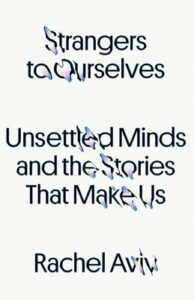Mood: Reflective, Informative, Emotional
Pace: Medium
Content Warning(s): Eating Disorders, Addiction, Self Harm
Strangers to Ourselves is divided into five sections, each dedicated to a different person’s story about mental illness, identity, and the way Western medicine influences their sense of self.
The book begins with a personal story about an early childhood anorexia diagnosis–Aviv recalls her time in the hospital, how the strange diagnosis impacted her family members, and most importantly, the way she processed the experience internally (and emotionally) as a very young child–
“The word ‘anorexia’ felt so powerful that I was afraid to say it. I was learning to sound out letters, and words felt like tangible entities that somehow embodied their meaning. I would not say the names of any foods because pronouncing the words felt like the equivalent of eating.”
Aviv uses her own experience with Western psychiatry as a jumping off point to explore diverse individual narratives that illuminate the power (and sometimes danger) of being labeled “mentally ill”. Strangers to Ourselves serves as a “reminder that this framework may also estrange us from the many scales of understanding required, especially in periods of illness or crisis, to maintain a continuous sense of self.”
Review by Sophia
BOOK DETAILS | BUY

Strangers to Ourselves poses fundamental questions about how we understand ourselves in periods of crisis and distress. Drawing on deep, original reporting as well as unpublished journals and memoirs, Rachel Aviv writes about people who have come up against the limits of psychiatric explanations for who they are. She follows an Indian woman celebrated as a saint who lives in healing temples in Kerala; an incarcerated mother vying for her children’s forgiveness after recovering from psychosis; a man who devotes his life to seeking revenge upon his psychoanalysts; and an affluent young woman who, after a decade of defining herself through her diagnosis, decides to go off her meds because she doesn’t know who she is without them. Animated by a profound sense of empathy, Aviv’s gripping exploration is refracted through her own account of living in a hospital ward at the age of six and meeting a fellow patient with whom her life runs parallel—until it no longer does.
Aviv asks how the stories we tell about mental disorders shape their course in our lives—and our identities, too. Challenging the way we understand and talk about illness, her account is a testament to the porousness and resilience of the mind. — Macmillan